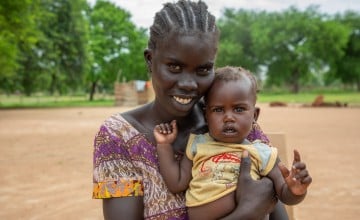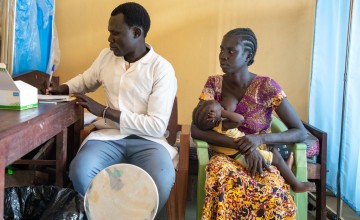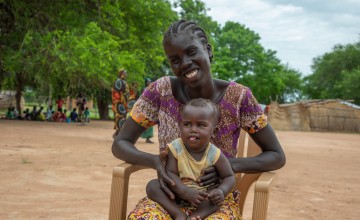
Read our 2024 annual report

Knowledge Hub
“I only found out my husband was sick after we got married. He would have convulsions and lose consciousness, sometimes for hours. The day he died, he was brought to this facility but there was no oxygen. So, we brought him to another facility, but there was no oxygen there either. We rushed him to Aweil Hospital but he passed on.”
In South Sudan, the world’s youngest country, life is hard enough without the loss of a spouse. As Adut describes the day she lost her husband, her nine-month-old daughter, Axlam, nurses at her breast. Adut has four children to feed.

“During the dry season, I usually sell groundnuts. I also prepare tea and sell it at the market. But during the wet season, like right now, I am mainly farming. I have planted groundnuts, okra, simsim, and maize. I am the only person, which makes it very hard.”
Irish Aid and Concern
Adut is sitting inside the Lueth Ngor Primary Healthcare Unit, operated by Concern, with funding from Irish Aid. Today, she is here for herself; a headache and dizziness, despite her bright smile. Before, it has been her children who needed attention.
“Axlam has been vaccinated at this facility. So far, she has been immunizsed here four times, and we are due for another one soon. The doctors here are so good. When you come with your child, they always receive us well. They examine the child, diagnose, and prescribe the correct medication.”

Since gaining independence in 2011, the people of South Sudan have suffered chronic conflict and insecurity. Compounding their struggle is climate change. South Sudan has always experienced seasonal flooding, but in recent years the flood waters have refused to recede, leaving large swathes of the country under water.
When families lose farming land and livestock, parents struggle to feed their children. Between July 2024 and June 2025, an estimated 2.1 million children in South Sudan suffered acute malnutrition. The health of the mother and the health of the child are inextricably connected. During the same time period, an estimated 1.1 million pregnant or breastfeeding women suffered acute malnutrition also.
“Now, the number of deaths has reduced”
In 2024, over 7,000 people were treated in the Lueth Ngor Primary Healthcare Unit, including nearly 800 children treated for malnutrition.
“Before Concern came here, there were a lot of problems, but now we are supported,” says Adut. “For example, now we are always treated for malaria. In the past, many people would die of malaria in this village. Now, we have no cases of children dying from malaria. My children have been treated for malaria here, and other illnesses."

“Before, we had a lot of problems in childbirth. Now, we deliver with proper support. It doesn’t even feel like we are delivering because we don’t experience any pain. We are even given medication for post-natal support. Before Concern operated this clinic, there was no follow-up care for women after they gave birth. There were miscarriages, and sometimes women would die from bleeding. Now, the number of deaths has reduced.”
Names have been changed




